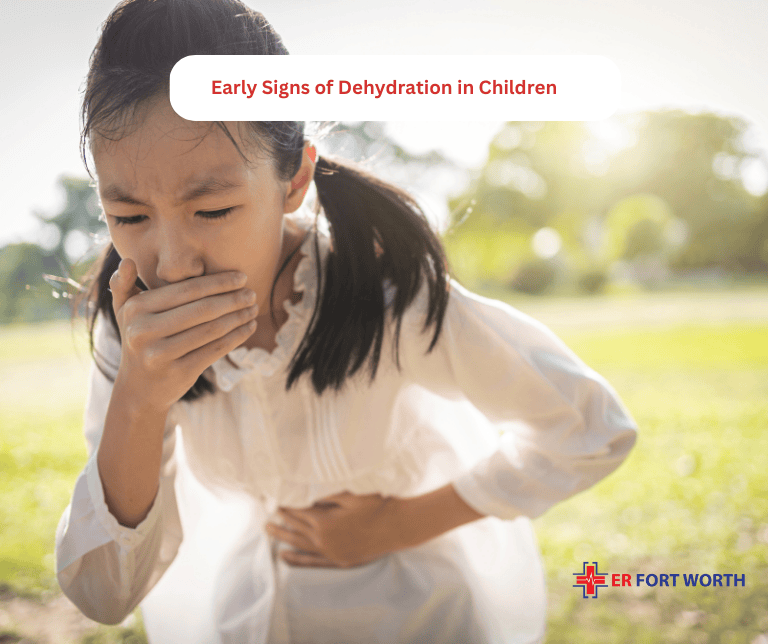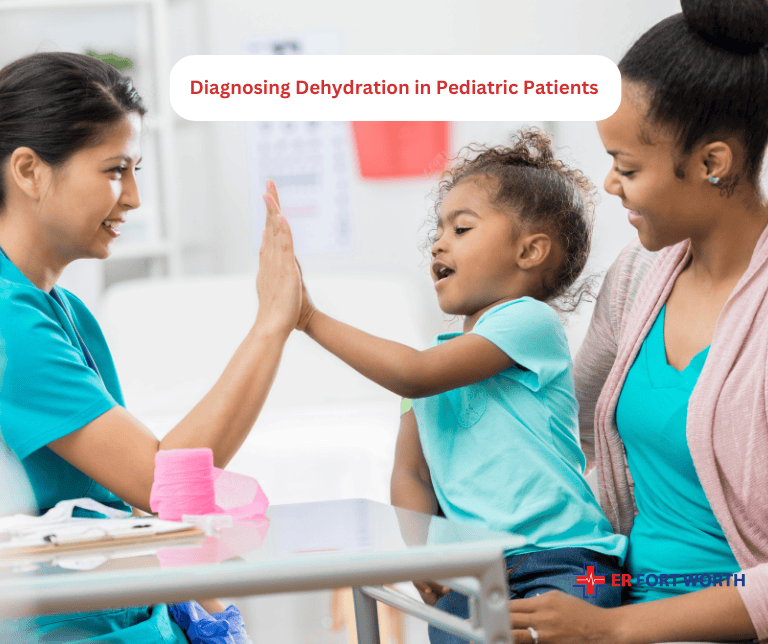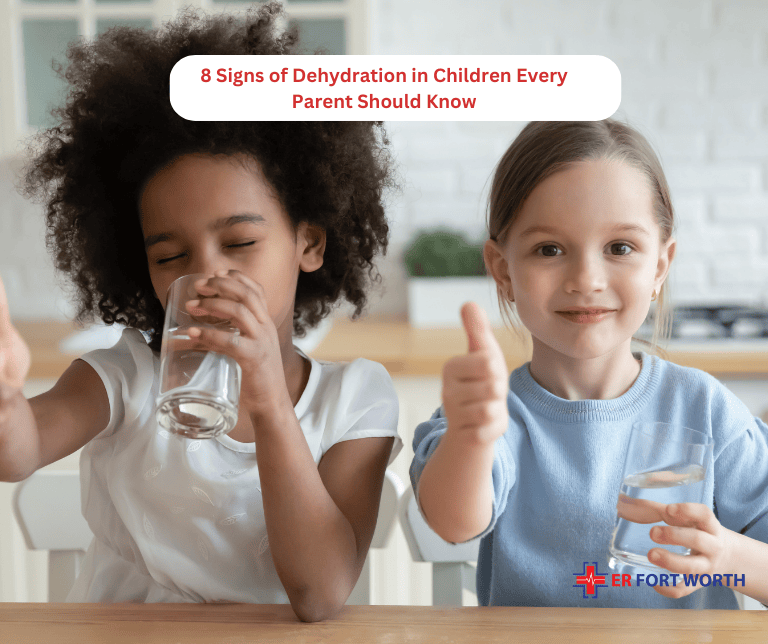Dehydration in children is common due to their higher water needs and limited ability to communicate thirst. This serious condition can escalate quickly, catching even the most attentive parents off guard.
Dehydration occurs when the body loses more fluids and electrolytes than it takes in. As water–the lifeblood of our cells–depletes, it compromises vital bodily functions like temperature regulation and overall well-being.
But how do you recognize the warning signs of dehydration in children? Recognizing these crucial indicators can empower you to act quickly and prevent complications.
Mild, Moderate and Severe Dehydration in Pediatrics
Dehydration in children is classified into three categories:
- Mild Dehydration: It’s a slight fluid loss that could be cured with increased fluid intake.
- Moderate Dehydration: This condition gives noticeable symptoms in children such as sleepiness. It may require rehydration solutions.
- Severe Dehydration: It’s a serious lack of fluids that needs immediate pediatric care. It’s mostly treated with IV fluids.
Early Signs of Dehydration in Children

Keep an eye out for these common signs of dehydration in children in its early stages and prevent it from becoming severe:
- Dry Mouth and Lips. If your child’s lips appear chapped or their mouth is parched, it’s time to increase their fluid intake.
- Less Frequent Urination. If your child uses the bathroom less frequently than usual, it could be a red flag. For toddlers still in diapers, fewer wet diapers than normal may indicate mild dehydration. Dark yellow urine is another sign of dehydration.
- Lethargy and Fatigue. Dehydration can make your little one feel sluggish or less energetic, especially in toddlers who are usually active but seem uninterested in play when dehydrated.
- Crying Without Tears. Crying without tears is a more noticeable sign of dehydration in pediatric patients. When they cry but produce no tears, this can indicate moderate to severe dehydration.
- Fontanelle or Sunken Eyes. Check the soft spot on the top of the infant’s head, the fontanelle. If it looks sunken, it’s a potential sign of dehydration. Sunken eyes are a more common symptom in older children.
- Cool, Dry Skin. Skin loses its elasticity due to dehydration. If you pinch your child’s skin and it doesn’t snap back quickly, this could be another sign. Additionally, the skin may feel cool to the touch even if your child is running a fever.
- Dizziness or Confusion. If your child seems disoriented, dizzy, or has trouble focusing, he might be severely dehydrated.
- Fast Breathing or Heart Rate. Your child’s body is struggling to cope with fluid loss resulting in rapid breathing and unusually fast heart rate.
Causes of Dehydration in Children
Several factors can lead to pediatric dehydration. Let’s explore the common causes so you can stop this silent threat in its tracks:
- Fevers, Vomiting, and Diarrhea: These are among the most common causes of dehydration in toddlers and young children. When a child is sick, their body loses fluids quickly.
- Not Drinking Enough Water: Another cause of dehydration is lack of fluid intake. Children may not always feel thirsty or they may be too distracted by play to drink enough water.
- Hot Weather: Exposure to hot, sunny weather can cause more sweat and lead to dehydration.
- Increased Physical Activity: Sports or active play can cause fluid loss through sweat, potentially leading to dehydration if your child doesn’t drink enough during or after the activity.
Treating Dehydration in Children
The good news is that treatment for dehydration in children is usually simple if caught early. Depending on the severity, your treatment options include:
Mild to Moderate Dehydration
- Oral Rehydration Solutions (ORS): ORS is a safe and effective way to replenish lost fluids and electrolytes, especially in toddlers. You can buy these solutions at most drugstores.
- Frequent Sips of Water: Give your child small, frequent sips of plain water or an electrolyte-rich drink. For infants, breastfeeding is best to replenish the lost fluids and electrolytes. In other cases, formula feeding can also help.
Severe Dehydration
- IV Fluids: If the dehydration symptoms are severe, intravenous rehydration is recommended. You may need to visit an emergency room nearby, where the doctors introduce fluids through an IV to restore hydration quickly.
Diagnosing Dehydration in Pediatric Patients

If you notice the dehydration symptoms in your child, it’s important to seek medical attention. The diagnosis of dehydration in pediatric patients involves:
- Physical Examination: A doctor will look for the signs of dehydration such as dry mouth and sunken eyes to determine the severity.
- Medical History: Reviewing the child’s medical history helps the doctor understand if the child has had illnesses such as diarrhea, vomiting, or fever that became the cause of dehydration.
- Laboratory Tests: In cases of severe dehydration, blood or urine tests may be necessary to check electrolyte levels and kidney function.
Preventing Dehydration in Children
Remember the following tips to prevent dehydration in children:
- Offer fluids regularly, especially during hot days or active play.
- Include high-water-content fruits and vegetables in your child’s diet, such as watermelon, cucumbers, and oranges.
- If your child has a fever or any other illness, monitor their fluid intake closely to prevent severe dehydration.
If your child exhibits symptoms of severe dehydration, rapid action is crucial. Our premier 24 hour pediatric urgent care Fort Worth is ready to help with pediatric emergencies, day or night. Our advanced clinical lab and specialized IV fluids treatment in Fort Worth ensures your child receives top-tier care when it matters most.
We proudly serve communities throughout the Dallas-Fort Worth metroplex, including Plano, Richardson, and Allen, with round-the-clock care for your little ones. Call us at 817-945-4200 now or visit our ER in Fort Worth directly for immediate assistance.
Get Emergency Pediatric Care Fort Worth
FAQs
How Can I Tell if My Baby Is Dehydrated?
Check for fewer wet diapers, dry mouth, sunken fontanelle, and tearless crying. A dehydrated kid also appears unusually sleepy and listless. Pinched skin that stays raised is another warning sign of dehydration.
What Is the Fastest Way to Rehydrate a Child?
Offer small and frequent sips of oral rehydration solutions (ORS). For older children, water, diluted fruit juices, and clear broths work well. In severe cases, IV fluids can be required under medical supervision.
When Should I Take My Child to the ER for Dehydration?
Seek immediate medical attention if your child shows signs of severe dehydration, including extreme thirst, sunken eyes, rapid breathing, or decreased consciousness. Dry mouth, cool extremities, and inability to keep fluids down also requires urgent care.




